Pathways 2023
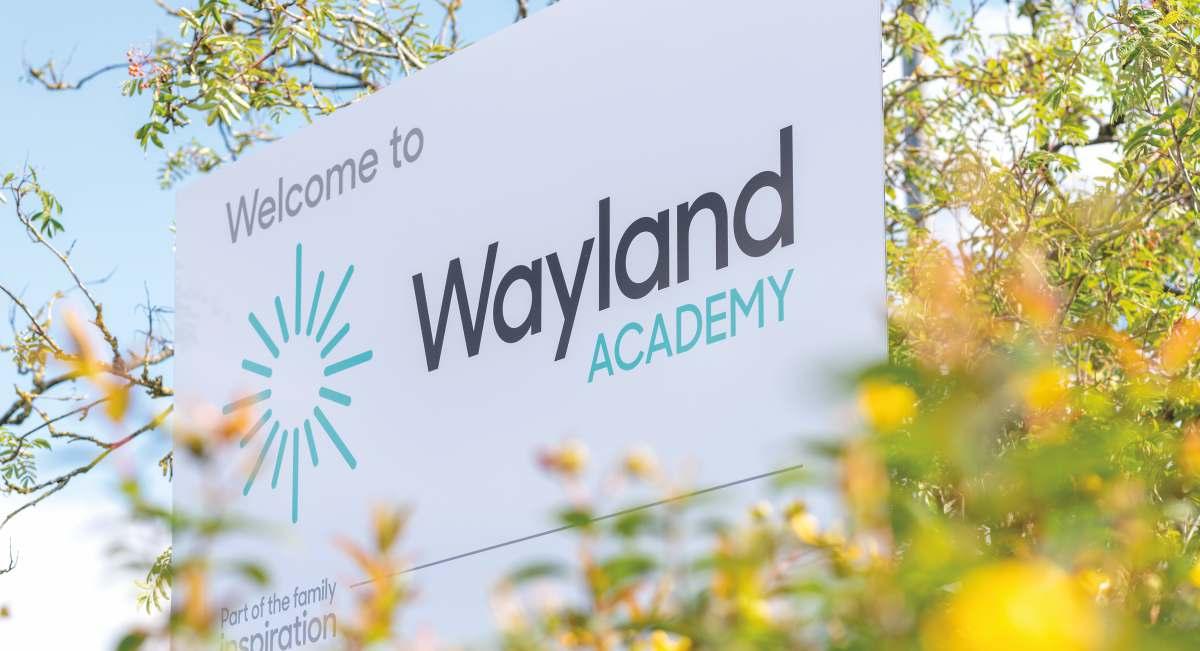






I am sure you do not need me to tell you how important it is to get the best results possible by the end of Year 11. Good results will ensure that you have the best possible opportunities when you leave Wayland Academy.
In September, you will be beginning the next phase of your education. This is a crucial transition and will involve subject choices that will shape your future plans. It is important that right choices are made, so that whatever your ability, you end up with a Pathways programme which promotes stimulation, enjoyment and enables you to have every chance of success.
You have a number of decisions to make, almost a third of your timetable will be decided by you, so you are in a unique position to be creative with your choices.
This booklet is for students and parents or carers. Please read this booklet carefully to think about your interests, ambitions, talents and progress to date. The combination of choices that you elect to study now will see you through to the end of your time at Wayland Academy; you will need to think carefully about the subjects you wish to study.
The Pathways you choose will give you the opportunity to pursue your preferred courses later at Sixth Form, College or on an Apprenticeship. All students are now required to remain in education or training until 18.
We shall do our very best to run as many courses as possible in order to meet demand. However, if a subject is undersubscribed you will be given your reserve or you may need to choose an alternative option.
This booklet gives the details of individual course requirements, but please be mindful that some subject information may change. Please take the time to consider your choices and do not hesitate to ask for advice from your teachers or Head of Year.
I hope that you nd this booklet useful and that, together, we can provide a programme in September which will help you full your ambitions and potential.
As well as your Pathways choices you will also study a number of compulsory subjects, we call these subjects ‘Core’.
These subjects are:
English Language
English Literature
Mathematics
Mathematics - Statistics
Combined Science
Physical Education
French Glen
Allott Principal, Wayland Academy
Most students are able to study all of the subjects they have chosen. However, if too many students wish to do a particular subject, or there are not enough to make a viable group, or the particular combination of subjects cannot work on the timetable, then reserve options will be used.
In addition, if the end of Key Stage 3 assessments and other examination marks gathered throughout Year 9 indicate that alternative options would be more appropriate, advice will be given.

If at any stage it looks like students will not be able to do a chosen subject, discussions will take place to establish alternative options.
The English Baccalaureate is intended to give students greater opportunity to study in and beyond the vital core of English, Mathematics and the Sciences. It therefore has particular focus on key subjects which, in the past, have been withdrawn from Key Stage 4 by some schools, even where students might benet from them. These include languages, for example, where research has identied that there are clear advantages in terms of cognitive skills and understanding. History and Geography have also been in decline.
The subjects promoted by the English Baccalaureate have been selected to give students the best opportunities for university and beyond. It's vital that students and their families understand the importance of option choices as we look on to potential university studies. Many of the subjects included here are a minimum entry requirement for degree level.
The subjects identied and included in the English Baccalaureate are: Mathematics, English, Computer Science, Sciences, Geography, History and Languages.
All students will complete the following curriculum:
GCSE English Language
GCSE English Literature
GCSE Mathematics
GCSE Mathematics - Statistics
GCSE Combined Science
GCSE French
Physical Education
Geography or History
*Students can study Geography and History

Art and Design
Business Studies
Computer Science
Design Technology
Further Maths
Hospitality and Catering
PE
Performing Arts
Psychology
Separate Science
Monday 27th March
Pathways Evening Parents and students can talk to subject teachers

Tuesday 18th April
Deadline for Pathways selections to be submitted via MyChildAtSchool
Tuesday 2nd May
Interviews to take place with students after this date to discuss Pathways selections
There will be two exam papers totaling 3.5 hours that students will complete at the end of Year 11. Both exam papers will test reading and writing skills.
Students will respond to three unseen texts taken from:
19th Century
20th Century
21st Century
Students will also have to complete a range of writing tasks for a variety of purposes. For example, describing, arguing, explaining, informing and persuading. 20% of the total marks will be awarded for spelling, punctuation and grammar.
Students will also have to complete a formal presentation which will be awarded in a separate certicate of Speaking and Listening.
Students will develop their reading, writing and oral communication skills through the study of a range of ction and non-ction texts from the 19th Century to the present day.

Students will be expected to infer, interpret and analyse texts; considering how the writer crafts and shapes them for effect. Students will continue to develop their writing skills for a range of different audiences and purposes.
Students will also demonstrate their oral communication skills by giving an individual presentation using standard formal English.
There exists a national expectation that all students will achieve a grade 4 pass in GCSE English Language and all students who meet this standard will not need to resit the paper.
A functional standard of English is essential in all workplaces and provides an excellent foundation upon which further studies can be based. In terms of Sixth Form progression, a Grade 5 pass at English Language will be necessary to access most English Literature courses at 'A' Level but a Grade 6 will be required to access most English Language 'A' Level courses
AQA English Language 1-9
This subject will be studied by all students alongside English Language.
Students will study:
There will be two exam papers totalling four hours that students will complete at the end of Year 11.
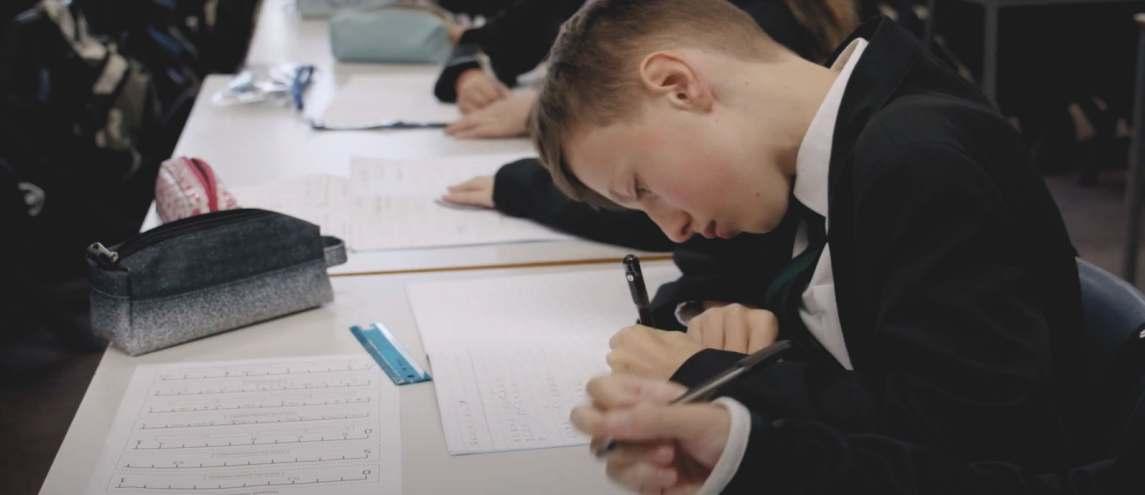
Students will be expected to demonstrate their understanding of all of the texts studied. They will be expected to explain themes, ideas and the writer’s craft (use of language, structure and literary devices).
These will be ‘closed book’ exams (students will not be allowed copies of the texts with them).
5% of the total marks will be awarded for spelling, punctuation and grammar.
A 19th Century novel
A collection of poetry from 1789 onwards
A Shakespeare play
20th Century fiction from the British Isles (play or prose)
GCSE English Literature is essential preparation for 'A' Level English Literature and English Language
English Literature remains an academically rigorous and highly rated subject for further study at 'A' Level and university. Learners exhibit strong analytical and communication skills, together with a logical and thorough grounding in literary and social history.
AQA English Language 1-9
This qualication in mathematics encourages students to develop condence using a range of mathematical skills and problem solving strategies and to recognise the importance of mathematics in their own lives and to society. This qualication ensures that students secure the fundamental skills required for everyday life; to manage money, make decisions and become systematic, logical thinkers. It also offers the opportunity to extend students' thinking to more abstract concepts; working with algebra to prove or disprove statements, for example.
Two tiers are available: Foundation and Higher (content is dened for each tier).
Tiered Papers:
Foundation, Grades 1 - 5
Higher, Grades 3 - 9
Each student is permitted to take assessments in either the Foundation Tier or Higher Tier - this decision will be made by the school following mock examinations.
The qualication consists of three examination papers, each lasting one and a half hours. The papers all contribute equally to the nal grade.
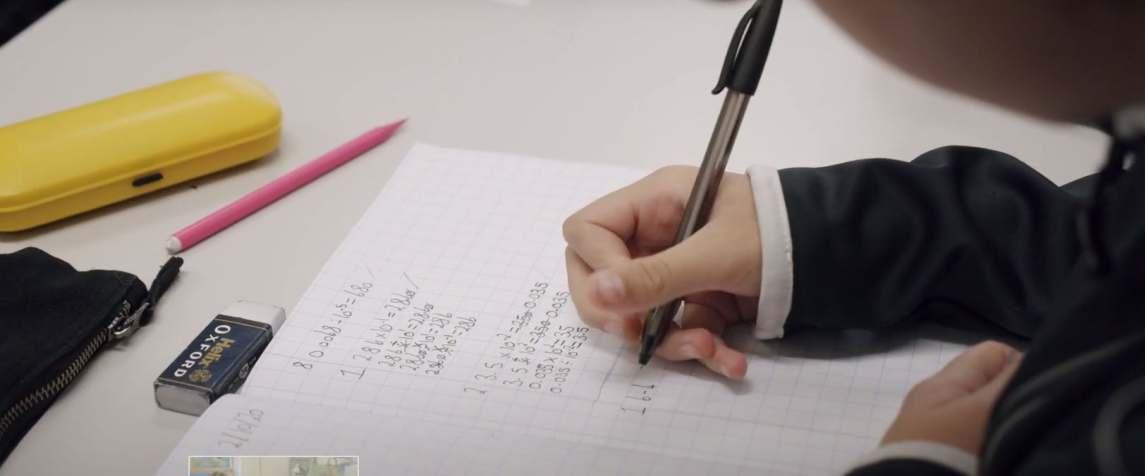
Paper 1 Calculator not allowed
Paper 2 Calculator allowed
Paper 3 Calculator allowed
Number
Algebra
Ratio, proportion rates of change
Geometry and Measures
Probability
Statistics
You will require a scientic calculator for these subjects.
All pupils will also be entered for GCSE Statistics (Foundation Tier). Students are introduced to the skills of statistical enquiry, and practise the underpinning statistical calculations and interpretation using real world data and authentic contexts. The majority of the required content is taught in Maths lessons with the additional material covered late in Year 11. The qualication consists of two examination papers, each lasting one and a half hours. The papers contribute equally to the nal grade
There exists a national expectation that all students will achieve a grade 4 pass in GCSE Mathematics and all students who meet this standard will not need to re-sit the paper. GCSE Mathematics at a good standard is a requirement for most Sixth Forms and many employment opportunities. Grades 7 to 9 in GCSE Mathematics are highly recommended prior to commencing A level Mathematics. A level
Mathematics is an extremely well recognised progression supporting a huge number of degree courses and careers such as economics, accountancy, design, architecture, law and medicine.
Edexcel Mathematics 1-9
Science is such an inspiring subject that has something to offer to every student. It impacts on every aspect of modern life. Science is the study of everything around you. You will use scientic methods to discover the answers to many questions and in the process you may even realise why we do not have all of the answers yet! Science will help you to access all types of careers. Some careers requiring science include: teaching, veterinary science, car mechanics, medicine, space technology, hairdressing, engineering, researching diseases and catering to name a few.
Double Award. Marked on a 17 point scale. 9-9 is the highest and 1-1 is the lowest. Six examination papers each 1 hour 15 minutes. 100% of course assessment. There is no controlled assessment, although practical lessons will help you answer questions in the exams.
The course is divided into biology, chemistry, and physics lessons. There is also an element of mathematics and working scientically. Both courses allow you to continue your studies at A-level in any of the science courses.
The following are possible progression routes with many providers:
9 – 6 grades in GCSE can lead to A levels in science subjects. 5 – 1 grades in GCSE will allow progression to NVQ level 2 courses. Both Combined and Triple GCSE Science can lead onto any of the science 'A' levels. These in turn can lead to many careers including research, medicine, engineering and conservation.

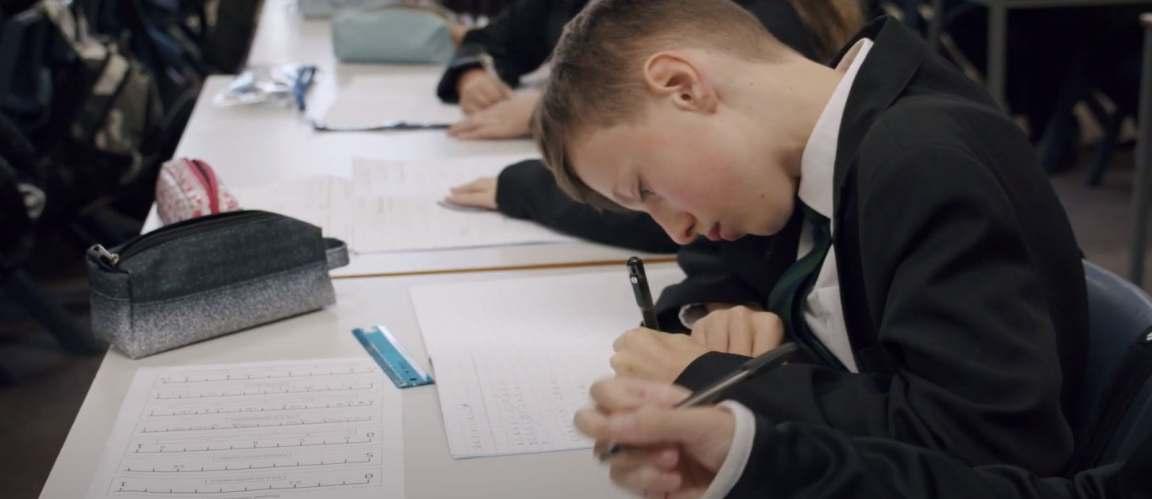
AQA GCSE Combined Science: Trilogy
A GCSE in French is highly valued by employers and is useful in many different careers, offering you the chance to work and communicate in other countries. You will gain condence by developing the skills to communicate effectively.

Students learn how to talk about themselves, their family and friends, hobbies, where they live, school, holidays and food and drink. They will build on these topics during the GCSE course, as well as moving on to new themes.
Throughout the GCSE course, students will have the opportunity to use their language and broaden their vocabulary through the use of a wide range of authentic resources.
Students will be assessed on four skill areas: Listening Reading
All elements other than the speaking will be externally assessed.
Self, family, friends, home life, shopping, meals, healthy living, illness and accidents, free time, fashion, media, relationships, celebrations and festivals, life in the countries and communities where the language is spoken.
Local, national and international areas of interest
Hometown, local environment, pollution, recycling, local facilities, comparisons with other towns and regions, weather and seasons, social issues, travel and holidays, campaigns and good causes.
Current and future study and employment
School education, work experience, part-time jobs, future plans/careers, technology.
This qualication provides a foundation for the further study of a Modern Foreign Language at AS and A2 and is the basis of lifelong language learning. It is, of course, invaluable for foreign travel. Languages can be studied on their own or combined with many subjects such as law, business, media, literature, history of art, sciences, humanities, IT and engineering. Studying a language promotes the development of communicative, interpersonal and presentational skills as well as increasing job opportunities
AQA French 1-9
“There is always something to learn in geography, it is great how we get to learn about physical geography and human geography. The teachers are so supportive. It is hard work but so worth it.”
The world is always changing and geography gives students the chance to learn about and understand these changes. Students will learn in exciting, creative and challenging ways. Studying geography will give students the knowledge and skills that many colleges, universities and employers are looking for.
There are three examinations at the end of Year 11. One on physical geography, one on human geography and an exam on eldwork and decision making. There are two compulsory eld-trips in Year 10. One is to Norwich, where you will compare three different areas. The other is to Overstrand, where you will be conducting experiments on coastal management, river processes and landforms
In physical geography you will be learning about the major forces which have shaped the world you live in, such as coasts, rivers , earthquakes, volcanoes, hurricanes and droughts. You will nd out how these hazards have affected people across the world.
In human geography you will be exploring how cities and towns vary around the world, how you can make these cities sustainable and improve shanty towns. You will also study economic development and industry and trade.
You will gain a range of skills that employers value, these skills will give you an advantage if you choose to study at a sixth form, college or on an apprenticeship. These include: group-work, eldwork, presentations, the use of visual resources, simulated games, ICT, extended writing, map-work, diagrams, graph-work, detailed case studies and research-based projects.
GCSE Geography is an excellent foundation for progression to 'A' level Geography, which sits well with both Science and Arts subjects. As Geography develops many transferable skills, this means a variety of degree options are available from Environmental Science, Development Studies to Architecture and Law.

AQA Geography 9-1
GCSE History focuses on the issues arising between nations during the turbulent 20th century, as well as in-depth studies in US and British history. If you have enjoyed what you have studied so far in history lessons, you will enjoy the GCSE course. As well as giving you the opportunity to study fascinating periods of history, you will gain valuable and transferable skills that will benet you in future employment. You will develop a range of skills such as communication, the ability to question and the condence to develop your own opinions.
Paper 1 Migration to Britain, c800-present and Notting Hill, 1948-1970 contributes to 30% of the overall mark.
Paper 2 Early Elizabethan England, 1558-88 and Superpower Relations and the Cold War. Contributes to 40% of the overall mark.
Paper 3 The USA, 1954-75: conict at home and abroad. Contributes to 30% of the overall mark.
Throughout the course students will study a number of units from different periods in history. Below is a brief summary of the types of topics students can expect during the course.
“History is a very interesting course, we have learnt about a range of topics. I would recommend this course; it’s a great GCSE. I especially enjoyed learning about superpower relations and the Cold War.”
Migration to Britain including William of Norwich in the Medieval period, the rise of Liverpool, Windrush and the importance of Notting Hill.
Elizabethan England including changes to the Church, Mary Queen of Scots' and the Spanish Armada.
US-Soviet relations including events in Cuba and Berlin.
The development of civil rights in the USA including events and individuals such as the Montgomery Bus Boycott and Malcolm X, as well as the US involvement in Vietnam.

History serves as a gateway subject for a vast number of professions such as the law, the media, the civil service, travel and tourism, the arts, museums and education, journalism etc. It is viewed as the best 'additional' subject for careers in such diverse areas as medicine, accountancy, business, engineering, architecture, art and design and ICT.
Edexcel History 1-9
In Art and Design you will use a wide range of materials, including 3D elements, to explore ideas and concepts inspired by both contemporary and historical artists and designers. You will be taught the practical and theoretical skills that you need to make creative and exciting work that you will show pride in.

Component 1: Portfolio: This is 60% of the total grade. You will create a portfolio of work to include evidence of drawing activities and written annotation, which is set and marked by the Academy then moderated by the examiner.
Component 2: Externally Set Assignment: This is 40% of the total grade. This is where students create a personal response to a chosen starting point from the exam paper with unlimited preparation time and a ten hour period of sustained focus to include evidence of drawing activity and written annotation (usually over two school days in the art room). Work is then marked by the teacher and moderated by the examiner.
Within this course there is the opportunity to study different endorsements: Fine art, drawing and painting, graphic design and three-dimensional design. You will be guided and shown how to: Collect your own written and visual research and present it. Demonstrate critical and cultural understanding.
“The thing I like about art and design is having to make my own mind up about my work, I enjoy the independence. I also love that I can experiment with different medias and apply these in interesting and creative ways to my work. I look forward to this subject all week.”
Use artists to link to and help to make your work better and record ideas through a range of media.
Review and rene work.
Develop your ideas through creating and presenting artwork. Communicate your ideas clearly.
Produce a nal piece of work that shows creativity and imagination.
As well as being a hugely popular and rewarding option choice at GCSE, Art and Design is highly favoured and respected by further education providers and employers. This is because they recognise that art students are focused, motivated and creative thinkers. Art students are naturally good at problem solving and pay close attention to aesthetic detail. In terms of Sixth Form progression and for a balanced and well-rounded creative experience, GCSE Art and Design is essential preparation for Fine Art, Art Textiles or Art Multimedia at A Level and for future careers in the creative industries.
Art and Design (art, craft and design)- 8201/C 8201/X
Students will apply their knowledge and understanding to different business contexts, ranging from small enterprises to large multinationals and businesses operating in local, national and global contexts. Students develop an understanding of how these contexts impact on business strategies and priorities.
Students will apply their knowledge and understanding to business decision making including:
The interdependent nature of business activity, inuences of business, business operations, nance, marketing and HR, and how these interdependencies underpin business decision making.
How different business contexts affect business decisions.
The use and limitations of quantitative /qualitative data in making business decisions.

The course is assessed by two exams at the end of Year 11.
Paper 1: Inuences of Operations and Human Resource Management on Business Activity - 50% of the GCSE.
Paper 2: Inuences of Marketing and Finance on Business Activity - 50% of the GCSE.
Students will study six units of work:
Business in the real world
Inuences of business
Business operations
Human resources
Marketing Finance
Students can study A level Business Studies at Sixth Form and there are a plethora of generic and specialist business courses at university and college in management, accountancy, marketing and nance. GCSE Business also provides a strong foundation for employment, with students progressing with further training / apprenticeships into a wide range of careers such as banking, sales, product management and general management
AQA Business 8132
Studying computer science encourages students to:
Understand and apply the principles and concepts of computer science, including abstraction, decomposition, logic, algorithms and data representation.
Analyse problems in computational terms through practical experience of designing, writing and debugging programs.
Think creatively, innovatively, analytically, logically and critically. Understand the components that make up digital systems, and how they communicate with one another and other systems.
Understand the impacts of digital technology on individuals and wider society Apply mathematical skills relevant to computer science.

If you are interested in a career in cyber protection, social media, e-commerce, games development or robotics programming, this could be the option for you.
Two written papers:
Paper one focuses on computer systems.
Paper two requires students to apply knowledge and understanding gained in Component 1 and write or rene programs. Each paper is worth 50% of the nal mark.
Component 1 Computer systems: the central processing unit (CPU), computer
NOTE: Computer Science requires a highly mathematical approach. If you are not in a higher set for maths, please discuss this with a teacher before making your nal choice.
memory and storage, data representation, wired and wireless networks, network topologies, system security and system software. You will also explore ethical, legal, cultural and environmental concerns associated with computer science.
Component 2 Computational thinking: algorithms, programming techniques, producing robust programs, computational logic and translators.
Practical programming skills: you will be given the opportunity to undertake a programming task(s) during your course of study which allows you to develop your skills to design, write, test and rene programs using a high-level programming language. You will be assessed on these skills during the written examinations, in particular Component 2 (section B).
Students who enjoy Computing at GCSE can progress to study A Level or other Level 3 Computing courses. At university there is a wide range of computer based degrees with options to specialise in areas of particular interest. There is a serious skills shortage in the UK and globally of people who can write computer code. There are a wide variety of lucrative careers involving computing for those with a passion for the subject and a willingness to keep learning. In fact, the growth and evolution of new technologies means in the future there will be lots of jobs that require computing skills that we have not even thought about yet!
OCR GCSE Computer Science 1-9
Design and Technology is a popular subject option at GCSE. Students learn to be independent and creative, able to communicate ideas from design to prototypes. After completing this course students will have the opportunity to further their studies with A Levels or Diploma in Product Design, Textiles, Engineering, Graphics and 3D Design. Due to the GCSE specication students will learn skills in Computer Aided Design; Orthographic drawings; Product Analysis; Entrepreneurship and using specialist equipment. These skills can be applied to future careers in creative and skills-based industries.
The following elements are assessed during the course:
Core technical principles
Specialist technical principles
Designing and making principles
2 hour written exam, which contributes 50% of the overall marks and is scored out of 100.
Core technical principles 20 marks
Specialist technical principles 30 marks
Designing and making principles 50 marks
Non-Examination Assessment (NEA) contributes the other 50% of the overall mark. The elements assessed within this are:
Identifying and investigating design possibilities
Producing a design brief and specication
Generating design ideas
Developing design ideas
Realising design ideas
Analysing and evaluating
You will have the opportunity to develop an understanding of:
Materials, components and technologies and the ability to select these appropriately
How to read, interpret and work from drawings, plans and instructions
Quality and how this can be achieved through making to ne tolerances
Key technical terminology related to materials and properties
Commercial and industrial practices within the Fashion and Textiles industries
Career opportunities in the sector.
D&T teaches many transferable skills including Textiles, Core knowledge, Materials and Isometric Drawing which can lead to a variety of further education courses at higher education in Sixth Form or College. It leads specically into A-level Product Design/Textiles/Fashion/Art Textiles which are popular routes for D&T students. This is a very creative subject in which the wide range of skills developed can lead to jobs in industry such as engineering, architecture, product designer, graphic designer, fashion designer, dressmaker, costume designer and many more.

AQA Design and Technology
Pupils choosing this option will also be entered for Edexcel GCSE Higher Tier Statistics. This will be taught and examined in Year 10 before starting the L2 Further Maths course. This gives our most able mathematicians the chance to exceed a Grade 5 in GCSE Statistics and allows much of the prerequisite maths content to be taught in the core curriculum before L2 Further Maths teaching commences in the summer term of Y10.
This qualication lls the gap for high achieving students by assessing their higher order mathematical skills, particularly in algebraic reasoning, in greater depth, thus preparing them fully to maximise their potential in further studies at Level 3.
This qualication places an emphasis on higher order technical prociency, rigorous argument and problem solving skills. It also gives an introduction to calculus and matrices and develops further skills in trigonometry, functions and graphs.
The AQA Level 2 Certicate in Further Mathematics is an untiered Level 2 linear qualication for learners who already have, or are expected to achieve, Grades 7, 8 and 9 in GCSE mathematics. It is aimed at students who are likely to progress to A-Level study in mathematics and possibly further mathematics.
The qualication consists of two examination papers, each lasting 1 hour 45 mins. The papers contribute equally to the nal grade.
Paper 1 Non-calculator
Paper 2 Calculator allowed
Paper 3 Calculator allowed

Number Algebra
Coordinate Geometry (2D only)
Calculus
Matrix Transformations
Geometry
You will require a scientic calculator for these subjects.
A level Mathematics is an extremely well recognised progression supporting a huge number of degree courses and careers such as economics, accountancy, design, architecture, law and medicine.
AQA Level 2 Certicate in Further Mathematics
This GCSE in Food Preparation and Nutrition will equip you with the knowledge, understanding and skills required to cook and apply the principles of food science, nutrition and healthy eating. It will encourage you to cook and will enable you to make informed decisions about food and nutrition and will allow you to acquire the knowledge and understanding required in order to be able to feed yourselves and others affordably and nutritiously, now and later in life.
This qualication in food preparation and nutrition will enable you to make connections between theory and practice so that you are able to apply your understanding of food science and nutrition to practical cooking. The content relates to the study of both food and drinks.
By studying food preparation and nutrition you will be able to: demonstrate effective and safe cooking skills by planning, preparing and cooking a variety of food commodities whilst using different cooking techniques and equipment, develop knowledge and understanding of the functional properties and chemical characteristics of food as well as a sound knowledge of the nutritional content of food and drinks, understand the relationship between diet, nutrition and health, including the physiological and psychological effects of poor diet and health, understand the economic, environmental, ethical and socio-cultural inuences on food availability, production processes, diet and health choices, demonstrate knowledge and understanding of functional and nutritional properties, sensory qualities and microbiological food safety considerations when preparing, processing, storing, cooking and serving food, understand and explore a range of ingredients and processes from different culinary traditions (traditional British and international) to inspire new ideas or modify existing recipes.
Component 1:
1 hour 45 minutes, 50% of qualication, 100 marks. Two sections both containing compulsory questions; Section A: questions based on stimulus materials, Section B: a range of question types to assess all content related to food preparation and nutrition.
Component 2:
Assessment 1: The Food Investigation Assessment, 8 hours task, 15% of the total marks available will involve practical experimental work and written work based on a specic food commodity e.g. bread, pastry.

Assessment 2: The Food Preparation Assessment, 12 hours task, 35% of the total marks available will involve research to respond to a given brief plus planning, preparation, cooking (1 x 3 hour session) and presentation of three dishes plus accompaniments (if appropriate) to form a menu.
The qualication will build on subject content which is typically taught at Key Stage 3 and provides a suitable foundation for the study of Food and Nutrition at Level 3, for example Level 3 Certicate in Food Science and Nutrition. This qualication will also provide a coherent, satisfying and worthwhile course of study for you if you do not progress to further study in this subject. In addition, the qualication will introduce you to a new way of thinking about food which could help you make informed decisions about a wide range of career pathways including Diplomas in Hospitality and Catering; Animal nutritionist; Nutritional therapist; Dietician.
WJEC GCSE Food Preparation and Nutrition
BTEC Music is designed to teach you the technical and performance-based skills required for a career in the industry. Classes are delivered as teacher-led workshops to cover performance, composition and music production skills. During these sessions you will be introduced to a range of genres, an insight into the development of music from western classical, through fusions, Motown, punk rock, lm and modern styles such as K-pop and EDM. Exploring the musical elements of music and how to develop and enhance your practical skills. You will also have the opportunity to create a band/ensemble with others in your class to focus on band musicianship skills alongside your own solo growth in music. A career in the music industry requires a focused and determined approach, building a foundation of strong technique and mental resilience.
Students will be expected to practice their chosen instrument at home and will be offered 1-1 tuition in support of this.
You will be assessed on a range of technical skills: Music production, using software instruments, using audio and software tools, manipulation techniques, inputting and editing audio, using effects and structuring music.
Compositional skills and Elements of Music: exploring and extending ideas, using structure effectively, rhythmic and melodic patterns, development of harmony, instrumentation, scales and modes.
Performance skills: Improvisation sessions, mixtapes, demos, sharing samples,
“I love the fact that we all work so well together and have a good time. Music makes such a change from all the other subjects I take. I love the variety of the options I choose.”

remixing and reworking, white label, remote collaboration. Time management, selfdiscipline, working with others, correct and safe use of equipment, tuning, learning repertoire, physical preparation and exercises, instrumental or vocal technique, practice routines such as scales etc. following accompaniment and stage presence.
These will all be explored through solo and ensemble pieces.
Assessment is mostly practical based, and you will be assessed on the skills that you have learnt and can apply. Some aspects of the components are based on research and written work and also feature personal evaluations that contribute to the development of your practical skills. Lessons, assessments and performances will be lmed and in the Component 3 unit are performed to a live audience.
Component 1 - Exploring Music Products and Styles (30%)
Component 2 - Music Skills Development (30%)
Component 3 - Responding to a Commercial Music Brief (40%)
BTEC Level 1/2 Tech Award in Music Practice
“I love sports and this course has been great for me; I've been able to gain practical skills and improve my theory knowledge at the same time. It is hard work but it is worth the effort.”
It is a mainly a theory based course 70%. Pupils are assessed on their theoretical knowledge in written exams and in their own practical performance.
Pupils need to enjoy learning about both the physical factors that affect performance and the socio-cultural issues and sports psychology.
Pupils will also be assessed on their practical performance, they must be well organised with kit and be able to revise independently for exams and controlled assessments.
It is suited to pupils who are considering 'A' level PE in the future.
Depending on the quality of work produced in exams and the quality of practical performance pupils can achieve a GCSE grade 9-1
The nal GCSE grade is based on:
60% Theory Exam – two 1 hour exams at the end of Year 11 based on the information learnt in classroom lessons.
Paper 1 Physical factors affecting performance
Paper 2 Socio-cultural issues and sports psychology
10% Controlled Assessment – written coursework tasks completed in exam conditions in school.
30% Practical Performance – pupils are assessed on their practical performance in just 3 sports at least one individual (e.g. athletics or badminton singles) and at least one team sport (e.g. football or netball).
Practical Performance
Activities in lessons may include: Football
Netball
Badminton
Athletics
Ideally pupils need to competitively play at least one sport outside of school. Pupils can also be assessed in other activities outside of GCSE PE lesson time. All activities will be required to be lmed for assessment.
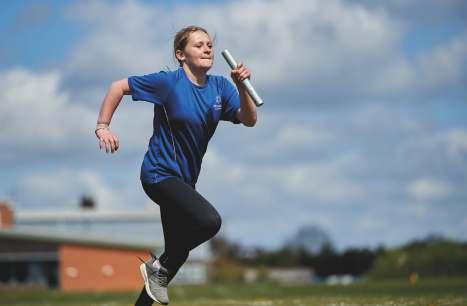
The structure and function of the musculoskeletal and cardiorespiratory system
Movement analysis
Effects of exercise and training
Components of tness, tness testing and training principles
Safety in sport.
Factors affecting participation
Commercialisation of sport
Ethics in sport
Classication & characteristics of skill
Goal setting, mental preparation and types of feedback
Benets of health, tness and well-being
Diet & Nutrition
Controlled Assessment
Analysing sports performance – strength and weaknesses
Produce an action plan to improve performance
This qualication can lead to further study in the area of Physical Education and Sports Studies. It gives a good grounding for anyone interested in sports science, teaching and coaching and for anyone who wishes to understand how to improve their own and others' participation and performance. It will also develop valuable leadership and social skills needed in all areas of life and build an understanding of the benets to health, tness and well being, showing how sport plays such a major role in our society.
By the start of Year 9, some of our pupils show a greater aptitude and afnity for learning Science. We would like to support and nurture this by offering the Separate Science pathway to a targeted group of pupils identied as capable of achieving the very highest level that GCSE Science can offer.
Pupils targeted for this course will receive extra curriculum time to learn the more in depth and exclusive science knowledge (above the standard Combined Science) needed to complete this course, for example: The use of science in medicine, sustainable food production, nanoscience, the science of polymers, space science and the behaviour of infrared Radiation.
Separate Science. Marked 1-9 in Biology, Chemistry, and Physics - ending in 3 GCSE grades overall.
Six examination papers each 1 hour 45 minutes which counts for 100% of the course assessment.
There is no controlled assessment, although some lessons include required practicals that will help you answer questions in the exams.
The course is divided into biology, chemistry, and physics lessons. There is also an element of mathematics and working scientically. This course allows you to continue your studies at A-level in any of the three sciences.
The following are possible progression routes with many providers: 9 – 6 grades in GCSE can lead to A levels in science subjects.
5 – 1 grades in GCSE will allow progression to NVQ level 2 courses.
Triple GCSE Science can lead onto any of the science 'A' levels. These in turn can lead to many careers including research, medicine, engineering and conservation.
AQA Science: Biology, Chemistry, Physics.

Edexcel GCSE in Psychology introduces students to psychological concepts and methodologies in the context of real-life issues, focusing on key questions, the work of renowned psychologists, ethical issues and the research students can undertake themselves.
There are two examinations at the end of year 11, which include a range of multiplechoice, short-open and open-response questions.
Paper 1 - 1 Hour and 45 Minutes - 55% of qualication.
Paper 2 - 1 Hour and 20 Minutes - 45% of qualication.
Throughout the course, students will cover a range of topics. Below is a brief outline of the topics students should expect to study. Key pieces of research within these areas will be studied and critiqued in addition to core theories within these elds. Students will develop skills of analysis, evaluation, essay writing and data handling, and will be expected to apply some areas of mathematics to the study of research methods.

Memory – Structures and processes of short and long term memory and the different types of amnesia.
The brain and neuropsychology – Structure and function of the brain, impact of neurological damage.
Social inuence – obedience, conformity, bystander effect and deindividuation.
Criminal psychology –Social Learning Theory, Operant Conditioning, biological explanations of criminality.
Language, thought and communication – communication differences between humans and animals, non verbal communication.
Research methods – design and evaluate research methods.
Psychology is a scientic subject in which pupils develop key skills such as analysis, language and data handling that are applicable in almost any chosen pathway; it is a sought after subject because of this. Psychology at GCSE level prepares students well for study at A-level, and also for pathways in education, police, business, advertising & marketing, health care, and social work. Some pupils may choose to pursue a career within psychology working in the eld of research, education, mental health, sport psychology and forensic (criminal) psychology, plus many more.
Edexcel Psychology 9-1
We hope that the courses offered will be available to all the students who want them but, we will ask you to give us a reserve choice.
Despite every effort to give all students their preferred choice, this may not always be possible. Alternatives may have to be considered if:
Too many students opt for a particular course
Too few students select a particular course
We wish to advise a better range of courses to meet a student's needs Combinations of courses are chosen which are impossible to timetable.

We always do our best to ensure that all students' choices can be matched but please bear in mind that students who submit options after the deadline may not nd it possible to be placed on their rst choice courses. As soon as the options deadline has passed, work begins on timetabling. Alterations to choices may not be possible from this point onwards.
Once a decision has been made and a course begun, it is extremely difcult to make any changes. It is therefore essential that time and thought be given to the combination of courses to be taken.
Staff will be available at the Pathways Evening to discuss option courses. Discussions with teachers, tutors and Head of Year. Students will also have an informal interview to discuss their option choices with a teacher.
The English Baccalaureate (EBacc) is made up of the subjects which are considered essential to many degrees and open up lots of doors.
Research shows that a student's socio-economic background impacts the subjects they choose at GCSE, and that this determines their opportunities beyond school.
A study by the UCL Institute of Education shows that studying subjects included in the EBacc provides students with greater opportunities in further education and increases the likelihood that a student will stay on in full-time education. Sutton Trust research reveals that studying the EBacc can help improve a young person's performance in English and maths.
Based upon this we ensure that all students in Set 1 and 2 are accessing the full EBacc. Students in English set 3 and 4 will not be studying French.
You like it or it is interesting
You can develop new skills by doing it
You need it or it's useful for your future career
It will combine well with other options and help your general education - it will give you satisfaction
Your friends are doing it
It's thought of as a cool option by your peers
You can't think of anything else to choose
You think it will be easy
Most people are likely to have several changes of job during their working lives and that most employers will wish to see a balance of subjects studied, including English and mathematics.
Make sure that you take advantage of all the support on offer. Discuss the Pathways subjects you are considering with your parents or carers at home, as well as teachers in school. Make sure that you understand all of the relevant information about individual subjects which you are interested in, for example, the qualication awarded, the assessment requirements, progression to sixth form and further education.
If you, or your parents/carers, are unsure about anything at any stage during the Pathways process, please feel free to contact the relevant teacher or Head of Year for further advice.
T: 01953 881514
E: ofce@waylandacademy.org
W: www.waylandacademy.org